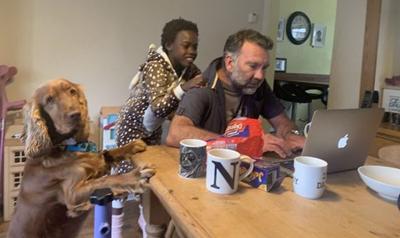My COVID-19 blog - Working at working at home: a view from 'Guilt Central'

During this COVID-19 lockdown period, Dr Nick Maguire, Associate Professor in Clinical Psychology, shares his experience of working from home.
With the advent of the COVID-19 pandemic, I am, as you all are, now working from home. But what does that actually mean? Should be simple enough – do the work that I would normally do in the University, but at home. Such an uncomplicated proposition should be so easy to achieve, even if meetings need to be virtual and even more of the communication is via email.
So why is it I feel completely incompetent in all things that I’m trying to do? Why does my daily ‘to do’ list remain steadfastly undone, devoid of pleasing lines through accomplished tasks? And why did that Teams meeting not quite go according to plan, with just one action identified following an hour and a half of blocky, fragmented discussion, and even that task not completely clear in terms of who was going to do it?
One factor for many is children. Although of course we love them more than anything in the world, they’re a pain when they need constant attention, cannot seem to just get on with these ‘home schooling’ simple (ha!) tasks and want to contribute to every Teams meeting, if only to see themselves on the screen. I’ve developed a whole new set of skills around seeing the danger as it emerges and muting microphones and cancelling video before the inevitable meltdown completely disrupts proceedings.
And then there’s communication. Much as we might want to believe that Teams (as useful as it is) is as good as a personal meeting, it isn’t. There are all sorts of interpersonal cues and subtle behaviours important to effective communication that are just not available when all you have is a 2-inch square view of each of the other attendees. Add to this my new and improved inability to structure my own day when I don’t have people to see, deadlines to hit etc and we have a perfect incompetence storm.
And then there’s the guilt. The guilt from knowing that you didn’t get around to doing that thing that you promised you would for the next Teams debacle. And the guilt knowing that you’re neglecting your kids. Again. And the anger that your other half has claimed the quiet place for their meeting. And the guilt at feeling angry because they told you about it and you forgot. Or maybe they didn’t… And the guilt when you realise that you’ve been avoiding a task by engaging in advanced procrastination techniques which mainly involve cups of tea.
So what do we do about it? Accept. Accept that right now we’re just not going to be able to perform on all the fronts we might want to. We’re not going to be able to achieve the amount of work we’re used to, or the quality we might value. We’re juggling too much in an environment where communication is impaired and certainty about anything is an unobtainable luxury. Accept that, for those of us blessed (?) with children, we’re going to be only just good enough parents (and sometimes not even that) and our own personal OFSTED rating is worse than appalling. And accept that work is going to be more effortful and the quality we want is going to be more difficult to achieve. Acceptance comes with compassion; the more compassionate we are with ourselves, the more we can accept our inevitable inadequacies. Oh, and watch the avoidance. It’s a vicious circle leading to yet more guilt! Although the tea’s nice.
